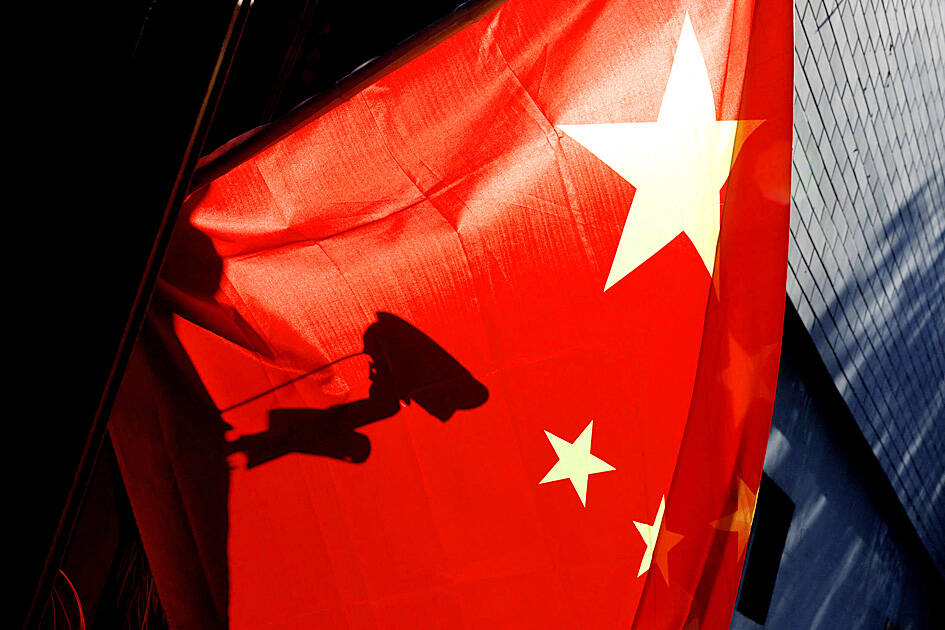The number of Chinese spies prosecuted in Taiwan has grown threefold over a four-year period, the National Security Bureau (NSB) said in a report released yesterday.
In 2021 and 2022, 16 and 10 spies were prosecuted respectively, but that number grew to 64 last year, it said, adding that the Chinese Communist Party (CCP) was working with gangs in Taiwan to develop a network of armed spies.
Spies in Taiwan have on behalf of the CCP used a variety of channels and methods to infiltrate all sectors of the country, and recruited Taiwanese to cooperate in developing organizations and obtaining sensitive information from Taiwan’s government, the report said.

Photo: Reuters
The bureau said it hoped that the report would help Taiwanese to better understand the CCP’s espionage operations in Taiwan.
The majority of people targeted by the CCP for recruitment are current or retired military personnel, it said.
Of the 64 spies prosecuted last year, 15 were retired military personnel, accounting for 23 percent of the total, while 28 were active personnel (43 percent of the total), it said.
Giving an example of how the CCP coerces military personnel, the report cited the case of one-star general Lo Hsien-che (羅賢哲), who was caught in a honey trap scheme while stationed in Thailand and later leaked military secrets to Chinese officials in exchange for payment.
The CCP infiltrates Taiwan through engagement with local gangs, illegal private money lenders, shell companies, religious groups and nonprofit organizations, the report said.
The CCP seeks operatives in Taiwan by building network connections, using financial incentives, coercing people with debt, and infiltrating military, government and civil society organizations, it said, adding that China also tries to interfere with elections in Taiwan.
The NSB said it has found evidence that gangs recruited by the CCP were asked to raise Chinese flags and engage in armed insurrection in the event of an attempted invasion by the Chinese People’s Liberation Army.
The insurrection plans called for trained snipers in Taiwan to attack members of the military and foreign organizations, the report said.
It also called for military personnel to fly helicopters to China to surrender during an invasion and to hand over Taiwan’s defense plans to the CCP ahead of such an invasion, it said.
The CCP pays recruits by transferring money through digital payment services or using cryptocurrencies, making payments hard to trace, the report said.
The NSB has established a mechanism for cooperation across the bureau, military and investigative agencies to address Chinese espionage, it said.
Prosecutions and conviction rates of spies have increased, and last year, investigators cracked a spy ring involving 23 people and sentenced one spy to 20 years of imprisonment, the report said.
The detection of espionage has been helped in the past few years by clues provided by military officers and soldiers, and the public, which showed that public awareness of security issues has greatly increased, it added.

The CIA has a message for Chinese government officials worried about their place in Chinese President Xi Jinping’s (習近平) government: Come work with us. The agency released two Mandarin-language videos on social media on Thursday inviting disgruntled officials to contact the CIA. The recruitment videos posted on YouTube and X racked up more than 5 million views combined in their first day. The outreach comes as CIA Director John Ratcliffe has vowed to boost the agency’s use of intelligence from human sources and its focus on China, which has recently targeted US officials with its own espionage operations. The videos are “aimed at

STEADFAST FRIEND: The bills encourage increased Taiwan-US engagement and address China’s distortion of UN Resolution 2758 to isolate Taiwan internationally The Presidential Office yesterday thanked the US House of Representatives for unanimously passing two Taiwan-related bills highlighting its solid support for Taiwan’s democracy and global participation, and for deepening bilateral relations. One of the bills, the Taiwan Assurance Implementation Act, requires the US Department of State to periodically review its guidelines for engagement with Taiwan, and report to the US Congress on the guidelines and plans to lift self-imposed limitations on US-Taiwan engagement. The other bill is the Taiwan International Solidarity Act, which clarifies that UN Resolution 2758 does not address the issue of the representation of Taiwan or its people in

US Indo-Pacific Commander Admiral Samuel Paparo on Friday expressed concern over the rate at which China is diversifying its military exercises, the Financial Times (FT) reported on Saturday. “The rates of change on the depth and breadth of their exercises is the one non-linear effect that I’ve seen in the last year that wakes me up at night or keeps me up at night,” Paparo was quoted by FT as saying while attending the annual Sedona Forum at the McCain Institute in Arizona. Paparo also expressed concern over the speed with which China was expanding its military. While the US

SHIFT: Taiwan’s better-than-expected first-quarter GDP and signs of weakness in the US have driven global capital back to emerging markets, the central bank head said The central bank yesterday blamed market speculation for the steep rise in the local currency, and urged exporters and financial institutions to stay calm and stop panic sell-offs to avoid hurting their own profitability. The nation’s top monetary policymaker said that it would step in, if necessary, to maintain order and stability in the foreign exchange market. The remarks came as the NT dollar yesterday closed up NT$0.919 to NT$30.145 against the US dollar in Taipei trading, after rising as high as NT$29.59 in intraday trading. The local currency has surged 5.85 percent against the greenback over the past two sessions, central